The benefits and limitations of hyaluronic acid
Select is editorially independent. Our editors selected these deals and items because we think you will enjoy them at these prices. If you purchase something through our links, we may earn a commission. Pricing and availability are accurate as of publish time.
If you suffer from chronically dry skin, odds are you’re intimately familiar with hyaluronic acid. The popular substance absorbs moisture and draws it into the skin in order to hydrate it, experts told us — though it’s especially useful for dry skin, it’s “a great hydrator for pretty much all skin types,” explained Dr. Mary Stevenson, assistant professor of dermatology at NYU Langone Health. “We don’t have a lot of products like that,” she added.
SKIP AHEAD How to shop for hyaluronic acid products | Hyaluronic acid benefits | How to use hyaluronic acid
If you’re curious about the benefits of hyaluronic acid, we spoke to dermatologists about how to use the skin care ingredient and got some specific recommendations from them for creams and serums. We also rounded up some top-rated hyaluronic acid products based on their advice.
What is hyaluronic acid?
Hyaluronic acid is a naturally occurring chemical produced by the body that cushions and moisturizes — it’s found in our skin, our eyes, our joints and our connective tissue, Stevenson said. In skin care, hyaluronic acid acts as a humectant, which means that it “draws in water like a sponge [and] can really help in hydrating our skin,” she explained.
“The end result is plump skin that looks great,” added board-certified dermatologist Dr. Barry Goldman.
Hyaluronic acid matched with a retinol is a match made in heaven.
Since products like salicylic acid and glycolic acid can irritate and dry out the skin, some people get immediately turned off by hyaluronic acid. However, both Goldman and Stevenson said that hyaluronic acid should work for virtually all skin types since it isn’t actually an acid. “It’s not like salicylic acid or some of the other acids that can be more exfoliating or abrasive on our skin,” Stevenson explained.
The only people who need to be careful, Stevenson warned, are those who might experience a reaction with one of the other ingredients in a hyaluronic acid product like essential oils or fragrances. “People with eczema or rosacea or extremely sensitive skin might want to apply a product either behind the ear or on their inner wrist for a few days in a row before putting it all over their face,” she advised. Stevenson added that people with sensitive skin should look for hyaluronic acid products that are fragrance-free and non-comedogenic in order to avoid irritation.
Hyaluronic acid products in 2022: Serums, creams and more
The dermatologists we spoke to said hyaluronic acid is generally well-tolerated by most skin types. They also noted that both serums and creams can be beneficial to the skin, and choosing one over the other comes down to personal preference. Below, we rounded up highly rated, dermatologist-recommended hyaluronic acid products as well as a few highly rated staff picks and options from notable brands.
The Ordinary Hyaluronic Acid 2% + B5 Hydrating Serum
For a lightweight hyaluronic acid serum, Goldman said he likes The Ordinary Hyaluronic Acid 2% + B5 Hydrating Serum. According to the brand, the serum is fragrance-free, alcohol-free and oil-free, which can be good for people with sensitive skin. It’s made with hyaluronic acid at different molecular weights, which allows the formula to hydrate all of the layers of the skin, the brand says.
The Ordinary Hyaluronic Acid 2% + B5 Hydrating Serum

The Ordinary Hyaluronic Acid 2% + B5 Hydrating Serum $7.50 at Ulta
The Ordinary Hyaluronic Acid 2% + B5 Hydrating Serum $7.50 at Sephora
Neutrogena Hydro Boost Gel Cream
Goldman also recommended this hyaluronic acid cream from Neutrogena, which happens to be Select writer Zoe Malin’s favorite moisturizer. According to the brand, it’s non-comedogenic and fragrance-free, and it’s formulated with additional humectants like glycerin to draw moisture to the surface. Neutrogena also has a hyaluronic acid serum in its Hydro Boost line.
Neutrogena Hydro Boost Gel Cream
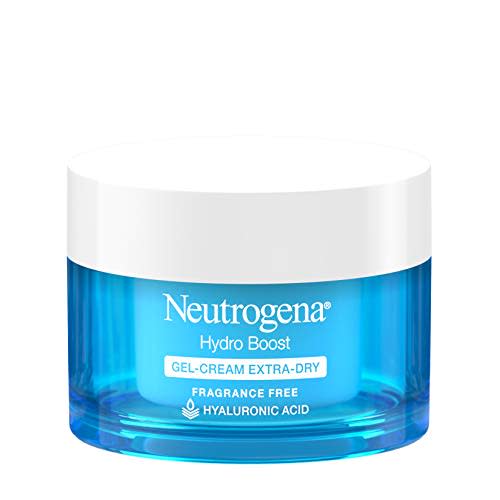
Neutrogena Hydro Boost Gel Cream $23.99 at Neutrogena
Neutrogena Hydro Boost Gel Cream $17.72 at Amazon
Neutrogena Hydro Boost Gel Cream $17.99 at Target
Dermalogica Skin Hydrating Booster
I struggle with dry skin — especially in the wintertime — and when I notice my skin starting to dry out, I update my routine with this serum, recommended to me by my esthetician. In addition to hyaluronic acid, the product contains panthenol, glycolipids and algae extract to hydrate the skin and reduce the appearance of dehydration lines, according to the brand. You can either use the serum before you apply your moisturizer or add a few drops into your moisturizer and apply them together, Dermalogica says.
Dermalogica Skin Hydrating Booster

Dermalogica Skin Hydrating Booster $64.00 at Dermalogica
Dermalogica Skin Hydrating Booster $64.00 at Skinstore
Peter Thomas Roth Water Drench Hyaluronic Cloud Mask Hydrating Gel
Select’s Rebecca Rodriguez uses Peter Thomas Roth’s Hydrating Gel twice a day and says it works wonders on her skin. According to the brand, the gel mask contains a 20-percent complex of hyaluronic acid and Pentavitin — a plant extract — to moisturize, plus vitamin E and aloe to revitalize dry skin. If you prefer a serum, Peter Thomas Roth also makes a Water Drench Hyaluronic Acid Liquid Gel Cloud Serum. Rodriguez recommended storing the gel in the fridge “for an added cooling effect.”
Peter Thomas Roth Water Drench Hyaluronic Cloud Mask Hydrating Gel
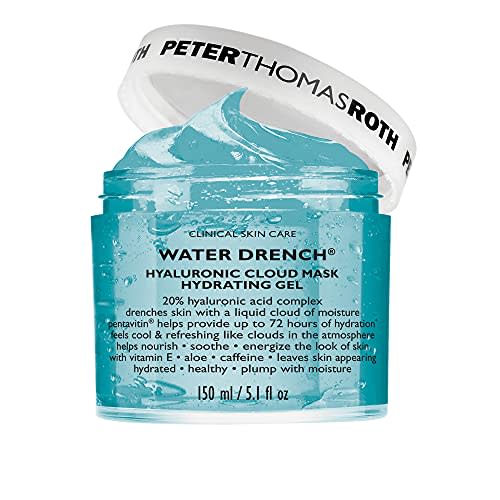
Peter Thomas Roth Water Drench Hyaluronic Cloud Mask Hydrating Gel $55.00 at Peter Thomas Roth
Peter Thomas Roth Water Drench Hyaluronic Cloud Mask Hydrating Gel $55.00 at Amazon
Peter Thomas Roth Water Drench Hyaluronic Cloud Mask Hydrating Gel $55.00 at Sephora
CeraVe AM Facial Moisturizing Lotion
In our guide to moisturizers for dry skin, licensed esthetician Rani Gupta said she uses CeraVe’s AM Facial Moisturizing Lotion on her eczema. In addition to hyaluronic acid, the non-comedogenic lotion contains ceramides to help restore the skin’s barrier and niacinamide, a form of vitamin B3 that can calm irritated skin, according to CeraVe.
CeraVe AM Facial Moisturizing Lotion
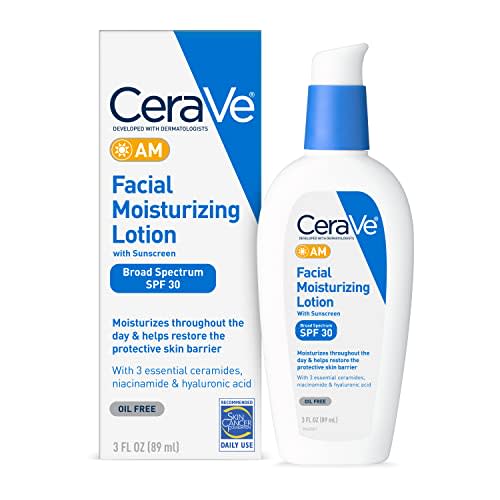
CeraVe AM Facial Moisturizing Lotion $12.49 at Amazon
CeraVe AM Facial Moisturizing Lotion $12.29 at Target
CeraVe AM Facial Moisturizing Lotion $18.99 at Ulta
Tatcha The Dewy Skin Cream
Board-certified cosmetic and general dermatologist Dr. Annie Chiu previously recommended Tatcha The Dewy Skin Cream, noting that it “couples antioxidant ingredients with deep moisture in an elegant, non-greasy formula.” The brand says that the non-comedogenic product uses a mixture of Okinawa algae blend and hyaluronic acid to capture water and hydrate the skin.
Tatcha The Dewy Skin Cream

Tatcha The Dewy Skin Cream $69.00 at TATCHA
Tatcha The Dewy Skin Cream $68.00 at Amazon
Tatcha The Dewy Skin Cream $69.00 at Sephora
Glow Recipe Plum Plump Hyaluronic Serum
Korean skin care brand Glow Recipe, which makes one of our favorite blackhead treatments, also makes a highly rated hyaluronic acid serum. The brand says that it uses five molecular weights of hyaluronic acid to hydrate each layer of the skin. It’s also formulated with three different antioxidant-rich plums that hydrate and rejuvenate the skin, according to Glow Recipe.
Glow Recipe Plum Plump Hyaluronic Serum
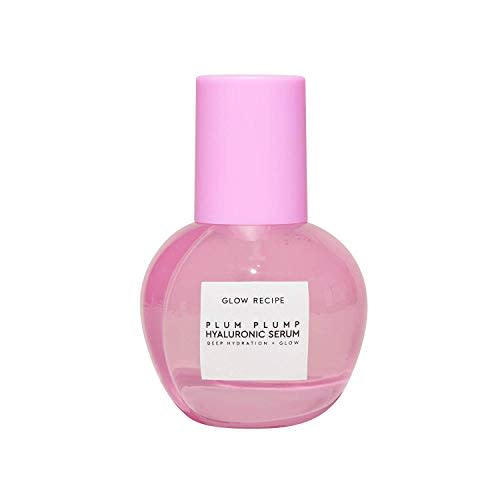
Glow Recipe Plum Plump Hyaluronic Serum $42.00 at Glow Recipe
Glow Recipe Plum Plump Hyaluronic Serum $42.00 at Sephora
Glow Recipe Plum Plump Hyaluronic Serum $42.00 at Amazon
La Roche-Posay Hyaluronic Acid Serum
Several dermatologists have recommended La Roche-Posay as a great drugstore skin care brand. The highly rated Hyaluronic Acid Serum contains glycerin and vitamin B5 for added moisture in addition to hyaluronic acid, according to the brand.
La Roche-Posay Hyaluronic Acid Serum
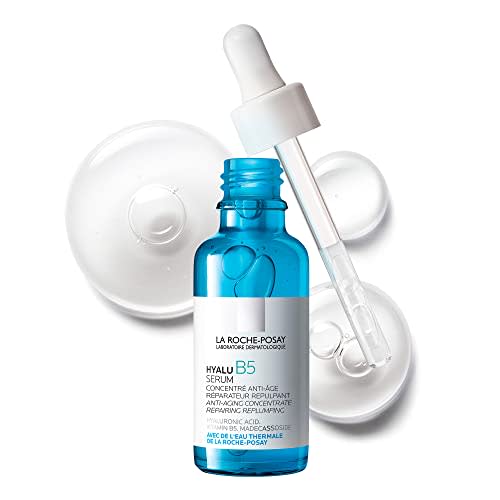
La Roche-Posay Hyaluronic Acid Serum $29.99 at Target
La Roche-Posay Hyaluronic Acid Serum $29.99 at Amazon
La Roche-Posay Hyaluronic Acid Serum $36.99 at Ulta
Glossier Super Bounce
This popular serum from Glossier contains three molecular weights of hyaluronic acid, according to the brand. It’s also formulated with pro-vitamin B5 for added hydration, Glossier says.
Glossier Super Bounce

Glossier Super Bounce $28.00 at Glossier
How to shop for hyaluronic acid
Hyaluronic acid comes in many different forms, but it’s most often found as either a serum or a cream. The dermatologists we spoke to said that while the water-based serums typically have a higher concentration of the active ingredient and are therefore the better option, creams can be a good option for those who don’t have time to wait for a serum to dry during their skin care routine.
“I think you get the best bang for your buck with a serum just because you’re getting the most concentrated hyaluronic acid with water and it’s just going straight into your skin,” Stevenson said. “[But] sometimes you need a one and done deal [and] for those patients, I think a cream is just fine.”
Hyaluronic acid serums will often advertise what percentage hyaluronic acid is in the product. According to Stevenson, anywhere from 1 percent to 2 percent is a “really reasonable concentration” for a serum. Some serums and creams will also advertise that they are formulated with hyaluronic acids at different molecular weights — that’s because “different weights penetrate differently, so you want a combination,” according to Stevenson.
“In general, low and medium [molecular weights] penetrate deeper into the lower levels of skin while high molecular weights hydrate the top or surface of the skin,” she explained.
What is hyaluronic acid good for? Hyaluronic acid benefits
Hyaluronic acid is good for anyone who wants to plump and hydrate the skin, experts told us. It’s also great when used in conjunction with more irritating ingredients like retinol that can dry out and irritate the skin. “Hyaluronic acid creams work well with retinol and vitamin C products to decrease the irritation that sometimes occurs,” Goldman explained. “Hyaluronic acid matched with a retinol is a match made in heaven.”
Though hyaluronic acid gives the skin a healthier and more hydrated appearance, Stevenson emphasized that it isn’t a “permanent fix” for wrinkles and fine lines. “Hyaluronic acid can reduce the appearance of fine lines and wrinkles because it’s basically plumping up the cell,” she explained. “It will just kind of add moisture back immediately because it’s holding on to these water molecules around your skin cells. It’s basically like blowing up a float toy.” If you want to reduce fine lines and wrinkles, she recommended using retinol in addition to hyaluronic acid.
How to use hyaluronic acid
Stevenson suggested using hyaluronic acid first, followed by an emollient moisturizer (like First Aid Beauty’s Ultra Repair Cream) or occlusive moisturizer (like Vaseline) that acts as a barrier to lock the moisture in. “For really dry skin you’re going to want to use something like a hydrator like hyaluronic acid and then you’re going to want to layer an emollient on top of that to help prevent the moisture that you’re gaining from evaporating from your skin,” she explained.
If you decide to use hyaluronic acid in conjunction with a product like retinol, Stevenson said you should sandwich the retinol in between the hyaluronic acid and a moisturizer to hydrate the skin while limiting the amount of irritation.
There’s no limitation to how many times you can use hyaluronic acid in a day. “Hyaluronic acid you can use morning and night, you can use it more times if you want — it’s just a really great hydrator,” Stevenson said.
Catch up on Select’s in-depth coverage of personal finance, tech and tools, wellness and more, and follow us on Facebook, Instagram and Twitter to stay up to date.
